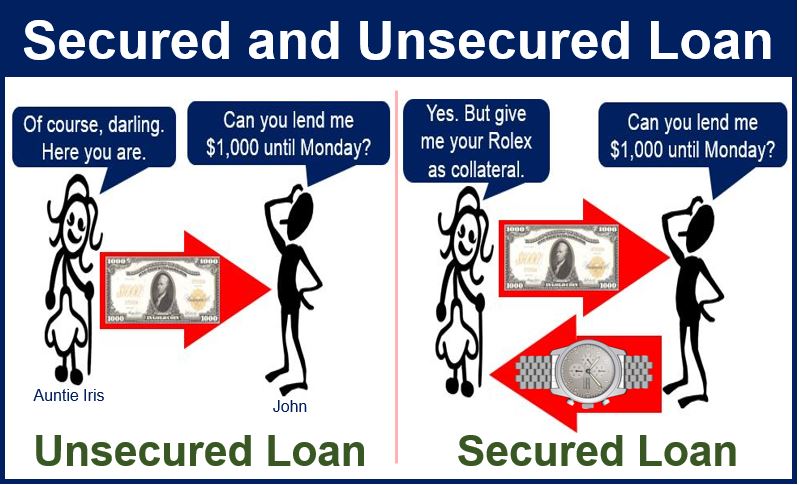A Secured Loan or Secured Debt is when the borrower has committed to give the lender certain assets, such as a real estate property or a car, if he or she defaults, i.e. fails to make payments. The lender has recourse to seize the asset and sell it to recoup the money lent.
The asset the borrower puts up as security is called the ‘collateral’ on the loan. The practice of pledging an asset as collateral on a loan is known as hypothecation.
When a homebuyer takes out a mortgage, the house being bought is put up as collateral, making it a secured loan. If the mortgagor (borrower) defaults, the lender will take possession of the house and sell it in order to recoup its money – this is known as foreclosure.

If after selling the collateral there is not enough money to pay off the debt, the lender may try to obtain a deficiency judgment against the borrower for the remainder. With a non-recourse secured loan the collateral is the only claim the creditor has against the borrower.
A secured loan is the opposite of an unsecured loan, as occurs with most credit card purchases when the issuer lends the card holder money and no collateral is involved.
As the risk is lower for the lender, secured loans tend to charge lower interest rates compared to unsecured debt. Other factors will also determine how much interest the lender will charge, including the borrower’s employment status, credit history, age, and ability to repay.
Advantages of a secured loan
- As mentioned above, with this type of loan the lender is relieved of much of the risk, which permits the second advantage.
- The borrower is more likely to get better terms than what would be available with an unsecured loan. He or she can probably borrow more and pay back over a longer period. In many cases, without putting up collateral the borrower might not be able to get the loan he or she wants.
- For individuals with a poor credit rating, this may be the only way they can borrow money.
- A secured loan is a good way to improve your credit rating (as long as you pay on time). Strategically, using secured loans can play a pivotal role in financial planning, as the collateral commitment often grants access to larger funds for significant investments like business expansion or property acquisition.
According to Barclays Bank “An alternative to taking a secured loan is to increase the mortgage on your property.”
Cambridge Dictionaries Online says secured debt is:
“A debt or debts that include an agreement for the lender to take particular assets from the borrower if the money is not paid back.
Vocabulary and concepts
There are many compound words that contain the term “secured loan” in the English language. Here are six of them, plus a brief definition, and an example of their usage in a sentence:
-
Secured Loan Agreement
A contract outlining the terms of a secured loan.
Example: “Before receiving the funds, the borrower signed the secured loan agreement, pledging their property as collateral.”
-
Secured Loan Refinance
Replacing an existing secured loan with a new loan, often with different terms.
Example: “They opted for a secured loan refinance to benefit from the lower interest rates.”
-
Secured Loan Consolidation
Combining multiple loans into a single secured loan.
Example: “To simplify her monthly payments, she chose a secured loan consolidation.”
-
Secured Loan Rate
The interest rate applied to a secured loan.
Example: “The secured loan rate was competitive, reflecting the reduced risk due to the collateral.”
-
Secured Loan Terms
The conditions and requirements specified in a secured loan.
Example: “The secured loan terms included a clause on early repayment penalties.”
-
Secured Loan Application
The process of applying for a loan that is secured by collateral.
Example: “He completed the secured loan application and submitted it with an appraisal of his assets.”
Two Educational Videos
These interesting videos featured on our partner YouTube channel, Marketing Business Network, explain the meanings of ‘Secured Loan’ and ‘Collateral,’ utilizing easy-to-understand language and and examples.
-
What is a Secured Loan?
-
What is Collateral?
